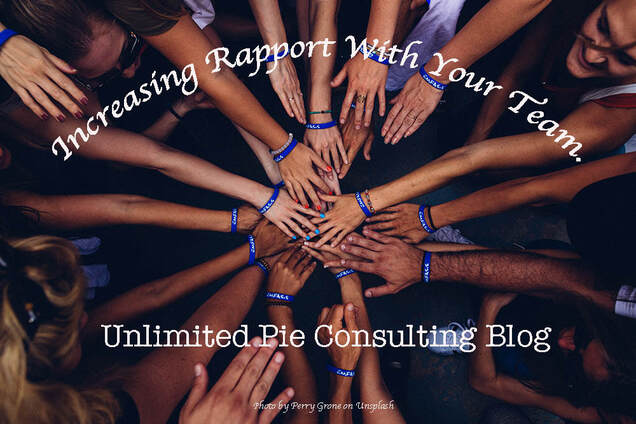|
As leaders we quickly learn (either by observation of a great leader or by creating our own "experiences") that the best way to increase productively and engagement, to create the culture where everyone wants to work with you, and get people to want to follow you is to maintain great relationships with your team. Relationships are everything. People may initially join your organization/team because of what you are doing, or making...but they stay based on the quality of the relationships that they have at work. I don't care what you do, offer, or sell, building relationships is a basic skill you need to become good at in order to be successful. Building and maintaining great relationships takes work and commitment on the part of the leader, and if done well, that work provides significant ROI for both the team we support and for the company we work for, or run.
How can we increase that rapport with those who chose to struggle with us? I was recently reading an article from Miller Heiman Group out of the UK. This article was written to sales people to teach them how to build rapport with their customers to increase sales opportunities. As I read through the article I was struck by how, with a little editing and massaging this material applied to those of us that lead. These four great techniques can be used by leaders to improve the relationships we maintain at work and home. 1. Develop a Clear, Complete, and Mutual Understanding of Your Team Member's Needs/Motivations. Without this understanding we, as leaders, are stumbling around in the dark trying to understand what motivates a team member. Don't ever forget that these needs/motivations your are going to hear are unique to each individual. You can't figure this out by looking at their birth date and applying some gen-experts opinions about what motivates people at that age (I deal with this topic in Episode 1 of Unlimited Leadership Podcast). Relationship building must be done on a regular basis; this is NOT a one-and-done event. We must make regular opportunities to talk to get a complete and clear picture. 2. Guide Your Team Member in Expressing What They Need. It takes sitting down with each individual team member and asking them specific questions intended to get at what it is that they are looking to accomplish and then really listening and processing what they say. Asking questions about what gets them excited, what makes them jump out of bed each day, what they love and hate about their job, what are they looking to accomplish in their lives? I have a list that I share with my clients that they can use during coaching sessions that will help them develop a clearer picture of what their team member needs so that we can create an environment where they chose each day to struggle with the team to accomplish great things. If I don't understand what is critically important to them, I will NEVER be able to create a great relationship with them. 3. Understand That Your Team Member's Needs Are Tied to Real Emotions. The needs, wants, and motivations of your team members are tied to solid emotions for that team member. While something that motivates one of your team members may seem silly or unimportant to you, remember that something has happened in that team member's life that makes that need/want/emotion critically important to them at this time. High Emotional Intelligence will help you get a better understanding of what is driving that emotion and empathy toward why that need is important will go a long way (see Episode 2 of Unlimited Leadership Podcast for more information about Emotional Intelligence). Empathy is a great relationship builder. If I truly understand why it is important to that team member I am more likely to remember and use that information when the opportunity presents itself as I work with that team member. Empathy is the great relationship builder. 4. End Each Meeting With an Action Plan. Even if that action plan is to meet again to find out more. It may not even be an action plan with the team member, it can be a commitment to come up with a way that you can use this information to help them enjoy what they are doing more, simply acquiring this information will accomplish nothing. As the leader we need to commit to using the information to help our team members become better, enjoy their work more, and/or accomplish what they view as important. If I don't I have just wasted their time and mine. You musk as yourself. "How can I use this information to help this make our relationship better?" and you must then commit to actually doing it. By using these four ideas; Developing a clear and mutual understanding of what they want/need, helping them express those needs/wants, understanding that those wants/needs are tied to emotions, and making an action plan for achieving those needs/wants, leaders can help their team members achieve what they want, while our team/department/business achieves what it needs. A true Win-Win-Win. They win, I win, the business wins. Unlimited Pie Consulting has many programs that will help you create the relationships and culture you want for your team and business. You can contact us with questions about how we can help you grow your team and business. I look forward to helping you grow your business. Make it a great week. Scott
0 Comments
|
AuthorScott is the owner and principle for Unilimited Pie. He has been many things in his life: Firefighter, Paramedic, Teacher, Business Owner, and Award Winning Leadership Development Expert. But what he is the most proud of are the leaders he has grown over the years in each of his roles. Leadership can be learned, if you have the right person to advocate for YOU. Archives
February 2020
Categories |

